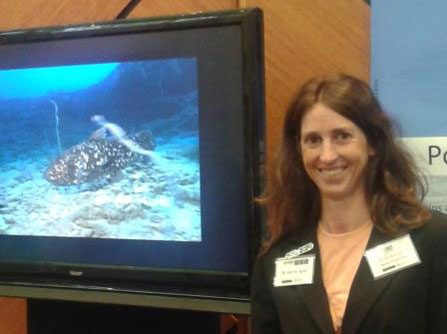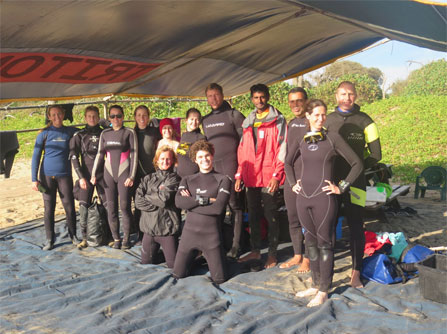Meet the Conservationist: A Passion for the Ocean - Kerry Sink
South African marine biologist, Dr Kerry Sink, is a powerhouse of insightful and decisive government planning, policy and management in the marine environment. She was the 2015 recipient of SCB’s Edward T. LaRoe III Memorial Award, “for absolutely outstanding leadership and self-sacrifice in mainstreaming marine biodiversity conservation research into South Africa's development planning, policy, management and industry arenas.” Phoebe Barnard interviews her colleague at SANBI.
Phoebe: How would you describe your main role in conservation? What is your job, and what kinds of activities do you handle in it?
Kerry: I see my role in conservation as the bridge between science and policy – I like to collate, boost and apply scientific information to make a difference. As SANBI’s marine program manager there is a lot of opportunity to work across this continuum and my daily activities span from field research, desktop work, mapping and analyses, engaging ocean industry stakeholders and government and synthesis of research into conservation action.
Key work I have been involved in includes the development of a network of new Marine Protected Areas to protect offshore ecosystems, species and the processes that sustain them. I also lead the marine component of the National Biodiversity Assessment which is exciting because it draws all the marine science into one place and undertakes new analyses with partners to identify what needs to be done to derive long term benefits from South Africa’s marine biodiversity. It’s very collaborative and I am privileged to assemble all the data and knowledge to form a big picture and plan the way forward. I also spend time working with the new cohort of marine scientists and managers, training post graduate students and working with managers in the fields of fisheries, threatened species and ecosystems, marine mining and petroleum.
|
|
Phoebe: What would you say are the most pressing issues facing African marine conservation today?
Kerry: In my view, key challenges facing African marine conservation include capacity constraints, poverty and the increasing disconnect between people and nature. As we move from the coast into the deep ocean, marine ecosystems are less accessible and many African marine ecosystems have never been seen let alone studied or protected. They are however under increasing exploitation and we need to partner with those able to access these ecosystems to develop the knowledge for sound management and to ensure protection.
Technological capacity and access is one issue but Africa needs to address the human capacity gaps in ocean use and management. In many cases there is poor local participation in offshore use and Africa needs to secure more local benefits from her ocean ecosystems. This may also help rebuild deep connections between people and marine and coastal biodiversity. We need to share ocean stories, images and benefits to reconnect people and marine ecosystems. These challenges are all related and everyone can help improve the situation. Closer cooperation with industry, regional and international collaboration in knowledge and capacity building and innovation in connecting people and nature are the urgent needs.
Phoebe: When did you decide you just had to go into conservation biology?
Kerry: I grew up knowing that I wanted to work in this field. Growing up in Durban, I spent time in wild places and lots of time on the beach and in the ocean. I started my first conservation projects in school – developing proposed alternatives to shark nets to improve bather protection and raising awareness about marine conservation issues.
Phoebe: Who are your conservation heroes?
Kerry: My conservation heroes include Christina Gjerde, high seas policy advisor to the IUCN– she is one of the clearest thinkers I know and has done a lot of work to advance better management in the high seas – the 64 percent of the ocean (and 50 percent of the planet!) that is the common heritage of mankind. I have learnt a lot from Jihyun Lee from the secretariat of the Convention of Biological Diversity who has helped grow regional capacity for marine biodiversity management across the globe, helping connect and grow the people who are leading ocean conservation efforts. Closer to home, I am inspired by a spectrum of conservation professionals in South Africa. Sonto Tembe, who has worked as a ranger at Ndumo Game Reserve for more than 30 years exemplifies a close relationship with the natural world and he is able to share and communicate his incredible observation ability to inspire a love and appreciation for nature. My Professor George Branch is a brilliant teacher who taught me how science matters and together with Pew Fellow Dr. Jean Harris led me on a path to use research to make a difference. Kristal Maze, my first boss at SANBI taught me how to engage big business and is a strategic and inspirational leader.
|
|

